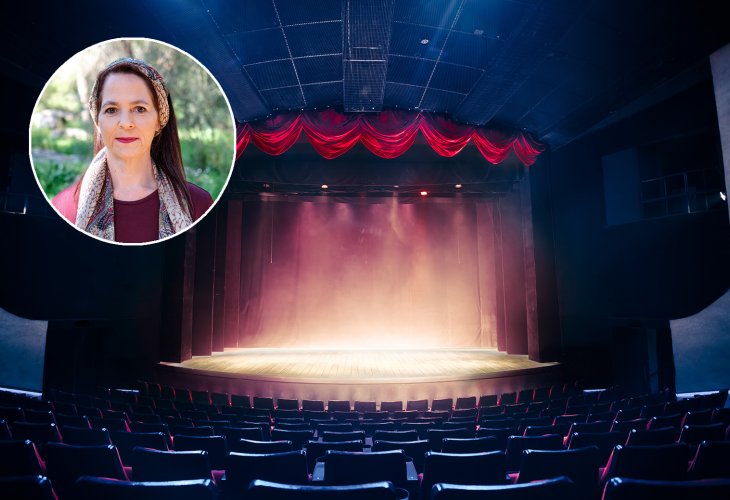From Tradition to Stage: Embracing Jewish Identity Through Theater
Noa Galor, a distinguished theater producer, shares her transformation sparked by a journey to the U.S. and how she's bringing uncompromising quality to Jewish women's theater.
 In the circle: Noa Galor (Photo: PR)
In the circle: Noa Galor (Photo: PR)"When I arrived in the U.S. for a mission, I felt a true connection to my Jewish roots for the first time," says Noa Galor, now recognized in the theatrical world as a talented director, bringing performances to many Orthodox communities across the country.
"I direct many plays, yet my personal journey feels like the greatest storyline of all," she shares, detailing her intriguing path towards embracing her Jewish identity wholeheartedly.
A Light of Judaism
"I was born into a traditional family," Noa begins her story. "My mother, a Holocaust survivor from a religious family, let go of tradition after the war. My father was not religious either but loved taking us to Chassidic festivals, with Chassidic music playing often at home. So, there was always some connection to tradition, though quite tenuous."
Since childhood, Noa was deeply involved in music and theater, her true passions. "Music is my native tongue," she explains. "I remember organizing school events, both backstage and on stage. The performing arts were simply part of who I am." She pursued professional studies in these fields, becoming a musical director for various productions.
"During my studies, I got married," she recounts, "and over the years, I was blessed with four children—one on the autism spectrum." Noa notes the profound impact music had when her son, in neonatal care, first responded to a harpist visiting the ward, confirming her belief in music's transformative power.
When her son was two, they moved to the U.S. for an educational mission, which opened her to Judaism.
How did it happen?
Looking back, Noa says it happened naturally: "Upon moving to the U.S., I felt a strong need to connect with the community. As I coordinated Hebrew studies programs, I delved into Jewish culture, finding it fascinating. I learned about weekly Torah portions, interpersonal commandments, and more, not simply teaching them but truly learning."
"The Orthodox Community Deserves It Too"
After five years, Noa returned to Israel with her family, facing challenges head-on. "During those times, our youngest was diagnosed on the autism spectrum, which was a major challenge," she shares. "Today, thanks to Hashem, he's highly functioning, volunteering in intelligence in the IDF, but it was a tough journey, with much prayer strengthening my faith."
Technically, returning was not easy for Noa. "I had to ensure proper settings for my children and our reintegration. Thankfully, I found work, grounding us back home, making it clear that our place was here, not abroad."
Nearly six years ago, Noa was offered a position managing Ofer Halevi's theater school for the Orthodox sector. "Taking on the role felt like coming home," she says. "Managing productions intended for the Orthodox audience felt natural. I realized, despite my faith and love for religion, I did not fully belong, prompting me to learn more to feel part of it. During this time, I wrote and directed many plays, including the renowned 'Sulika,' performed nationwide. After three and a half fruitful years, I began an independent path, continuing productions for the Orthodox community, including 'First and Foremost' and 'Reflections,' both inspired by wartime connections, thought-provoking and rich with messages. I also perform the song 'Who Will Rescue Us,' written and composed by poet Yehoram Galilee."
Do you think Orthodox plays should feature only Orthodox women?
"Some of our plays feature solely Orthodox actresses, but not all, which is just fine. As long as the actress identifies with the role and understands it, she can convey the message, regardless of her specific background."
And you? Have you learned from the Orthodox actresses?
"Absolutely, I've learned a lot. Initially, I viewed the Orthodox community as closed, unaware of quality cultural products. As I continued working with them, I discovered they're indeed high-level women deserving top-notch productions, like any woman in our nation.
"I was particularly moved by their interest in my personal life, stemming from genuine love and closeness. After years in competitive production teams, I found warmth and family-like support among our actresses. Their camaraderie is heartening, and when I mourned my brother, they comforted me, taking on commitments for his soul's elevation. It was truly touching."
What are your future plans?
"My mission is clear: to continue producing quality plays for the Orthodox community, feeling day by day that it's my calling. My aim is to achieve it to the fullest."

